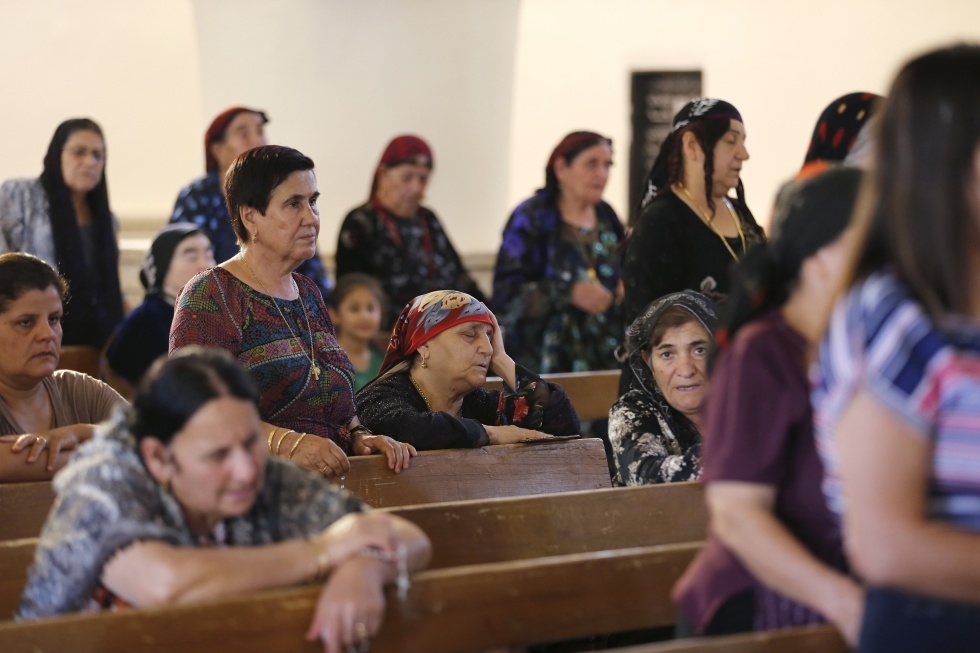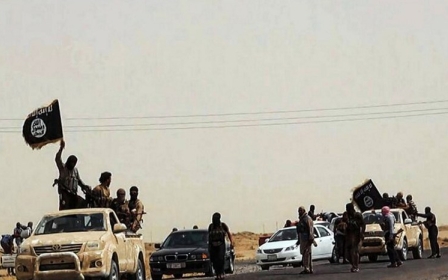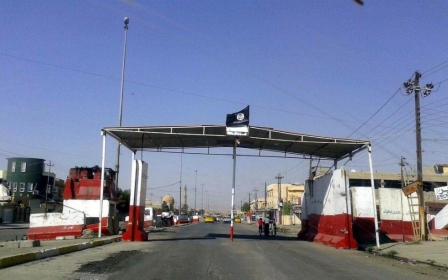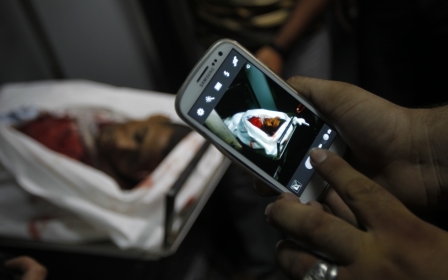Christians flee Iraq's Mosul after ultimatum by IS

Hundreds of Christian families fled their homes in Mosul Saturday before an ultimatum from the Islamic State (IS) threatening their community's centuries-old presence in the northern Iraqi city expired.
An AFP correspondent in Mosul, the main Iraqi hub of the IS proclaimed "caliphate", said Christians squeezed into private cars and taxis to beat the noon deadline.
"Some families have had all their money and jewellery taken from them at an insurgent checkpoint as they fled the city," said Abu Rayan, a Mosul Christian who had just driven out with his family.
IS who have run the city since a sweeping military offensive that began six weeks ago has told the thousands of Christians in Mosul they could convert, pay a special tax or leave.
An earlier statement by Mosul's new rulers had said there would be "nothing for them but the sword" if Christians did not abide by those conditions by 0900 GMT on Saturday.
While some families initially appeared prepared to pay the "jizya" Islamic tribute to stay in their homes, messages broadcast by mosques on Friday appeared to spark an exodus.
A teacher who gave his name only as Fadi was among a handful who had decided to stay.
"I'm staying. I already feel dead," he told AFP by telephone moments before the deadline ran out. "Only my soul remains, and if they want to take that I don't have a problem."
Chaldean patriarch Louis Sako, who heads the largest Christian community in Iraq, estimated there were still 25,000 Christians in Mosul on Thursday.
"This is ethnic cleansing but nobody is speaking up," Yonadam Kanna, Iraq's most prominent Christian politician, said.
"It is the first time in our history that something like this has happened. Muslims and Christians used to live together."
'Wiping out minorities'
The Islamic State "seems intent on wiping out all traces of minority groups from areas it now controls in Iraq," Human Rights Watch said in a statement Saturday.
Other minorities rooted in the same province of Nineveh have suffered even more, according to HRW, which documented crimes against the Yazidis, as well as the Turkmen and Shabak Shiite communities.
The mass displacement was the latest in weeks of turmoil which has forced more than 600,000 people from their homes, left thousands dead and brought Iraq to the brink of collapse.
Many of the displaced have sought the safety of the neighbouring Kurdistan region of northern Iraq, where Iraq's ailing President Jalal Talabani was expected to return Saturday from 18 months of medical treatment abroad.
Talabani is hailed as a skilled negotiator and has repeatedly mediated between Iraq's fractious politicians in recent years.
But some observers warned there was little the avuncular 80-year-old head of state could do to ease spiralling ethno-sectarian violence and roll back the IS expansion.
"I really do think this is a post-Talabani era," said Toby Dodge, director of the Middle East Centre at the London School of Economics.
Federal forces collapsed, in some cases abandoning uniforms and weapons in their retreat, when fighters under the command of IS leader Abu Bakr al-Baghdadi launched their assault last month.
The army has since regrouped, received intelligence, hardware and manpower from Washington, Moscow and Shiite militias respectively, but nonetheless struggled to regain lost territory.
Past mistakes
Security analysts have said Baghdad remains too big a target but the militants have repeatedly attacked targets that would expose the capital if captured.
On Thursday night, a jihadist commando stormed Speicher air base near ex-president Saddam Hussein's hometown of Tikrit, destroying a lot of military equipment and sparking a deadly battle with special forces.
Near-simultaneous car bombs went off in four districts of Baghdad Saturday, killing at least 12 people, according to police and medical sources.
A police officer was also killed in a roadside bomb blast targeting his vehicle.
Prime Minister Nuri al-Maliki is facing growing calls to step down, including from within his own Shiite alliance which comfortably won April elections, in order to advance national reconciliation efforts.
Iraq's most revered Shiite cleric Grand Ayatollah Ali al-Sistani on Friday appeared to lean in the same direction when he called for the formation of a government capable of "correcting the mistakes of the past".
Parliamentary blocs have until Sunday to submit nominees for the post of president, whose election is the next step in what has been a protracted and acrimonious process to renew Iraq's leadership.
According to an unofficial power-sharing deal reached after the 2003 US-led invasion of Iraq, that job should go to a Kurd.
Talabani's stature transcended bitter feuds within the Kurdish camp but there is little expectation the ailing head of state will seek another term.
New MEE newsletter: Jerusalem Dispatch
Sign up to get the latest insights and analysis on Israel-Palestine, alongside Turkey Unpacked and other MEE newsletters
Middle East Eye delivers independent and unrivalled coverage and analysis of the Middle East, North Africa and beyond. To learn more about republishing this content and the associated fees, please fill out this form. More about MEE can be found here.




